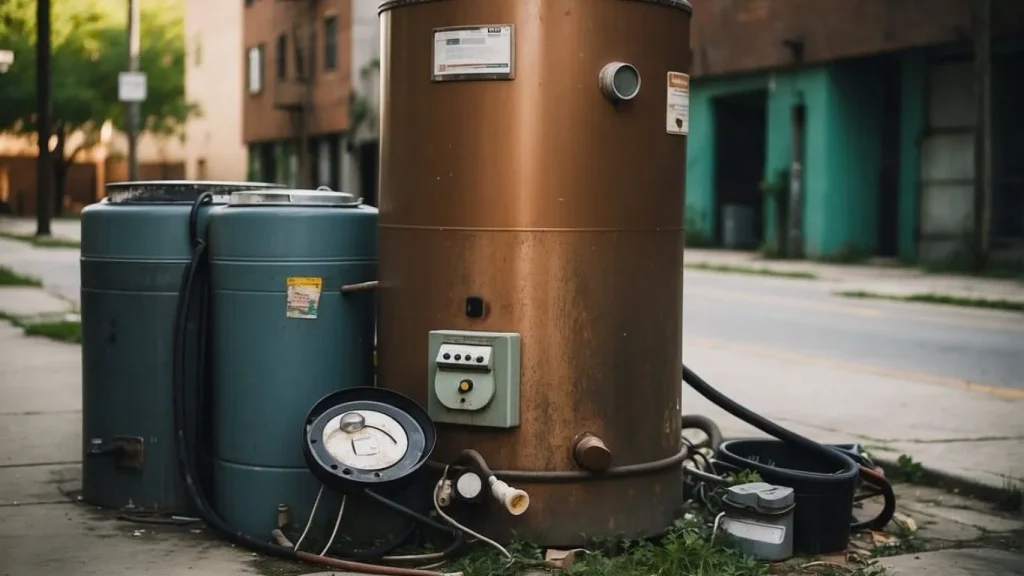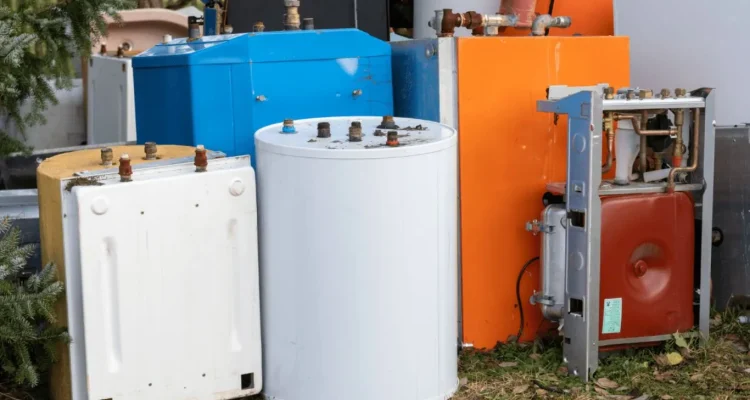Introduction
Getting rid of an old water heater isn’t as simple as tossing it to the curb. It’s essential to dispose of it properly to avoid environmental harm and adhere to local regulations. So, how do you go about it? Let’s dive into the step-by-step process of disposing of a water heater safely and responsibly.

Why Proper Disposal Matters
Proper disposal of a water heater is crucial for a few reasons. Firstly, old water heaters contain materials that can be harmful to the environment if not handled correctly. Secondly, improper disposal can lead to fines or penalties due to the violation of local waste management regulations. By disposing of your water heater properly, you’re doing your part to protect the environment and stay within the law.
Signs It’s Time to Replace Your Water Heater
Knowing when to replace your water heater is the first step towards proper disposal. Here are some signs it’s time for a new one:
- Age of the Unit: Most water heaters last about 10-15 years. If yours is older, it might be time for a replacement.
- Decreased Efficiency: If your water heater isn’t heating water as well as it used to, it might be on its last legs.
- Frequent Repairs: Constantly needing to fix your water heater is a sign that it’s time for a new one.
Preparation for Disposal
Before you can dispose of your water heater, you need to prepare it. Here’s how:
- Turning off Power and Water Supply: Ensure the power and water supply to the heater are turned off.
- Draining the Water Heater: Attach a hose to the drain valve and let the water flow out.
- Disconnecting the Unit: Carefully disconnect the water lines and electrical connections.
Recycling Options
One of the best ways to dispose of a water heater is to recycle it. Water heaters contain valuable metals like steel, copper, and aluminum that can be reused.
- Metal Recycling: Many recycling centers accept water heaters for their metal content.
- Electronic Components Recycling: Some parts, like the thermostat and heating elements, can be recycled separately.
Contacting Your Local Recycling Center
If you decide to recycle your water heater, the next step is to contact your local recycling center.
- Finding a Center: Look online or call your local waste management office to find a recycling center near you.
- What to Expect: When you arrive, you’ll likely need to fill out some paperwork and may have to pay a small fee.
Retailer Take-Back Programs
Some retailers offer take-back programs where they will dispose of your old water heater when you buy a new one from them.
- How They Work: Typically, you purchase a new water heater, and the retailer will take your old one away.
- Major Retailers Offering This Service: Home Depot, Lowe’s, and other major home improvement stores often have take-back programs.
Municipal Disposal Services
Your local government might offer disposal services for large appliances like water heaters.
- Scheduling a Pickup: Check your municipality’s website or call to schedule a pickup.
- Drop-off Locations: Some areas have drop-off locations where you can take your old water heater.
Hiring a Junk Removal Service
If you prefer a hassle-free option, consider hiring a junk removal service.
- Benefits: These services will handle all the heavy lifting and ensure your water heater is disposed of properly.
- Finding a Reputable Service: Look for reviews online and ensure the company is licensed and insured.
Scrap Metal Yards
Another option is to take your old water heater to a scrap metal yard.
- What They Accept: Most scrap yards will accept water heaters for their metal content.
- Getting Paid for Your Old Water Heater: You might even get a few bucks for the scrap metal.
Donating a Working Water Heater
If your water heater is still in good working condition, consider donating it.
- Finding Charities or Organizations: Contact local shelters, Habitat for Humanity, or other non-profits to see if they can use your water heater.
- Benefits of Donating: You get to help someone in need, and you might even get a tax deduction.
DIY Disposal Tips
If you’re up for the challenge, you can dispose of your water heater yourself.
- Safety Precautions: Make sure you wear protective gear and have the right tools.
- Step-by-Step Guide: Disconnect the heater, drain it, and then disassemble it into recyclable parts.
Avoiding Illegal Dumping
It’s essential to avoid illegal dumping, which can harm the environment and lead to hefty fines.
- Legal Consequences: Dumping your water heater illegally can result in significant penalties.
- Environmental Impact: Illegal dumping can contaminate soil and water, harming wildlife and ecosystems.
The Future of Water Heater Disposal
The way we dispose of water heaters is evolving, thanks to advances in recycling technology and sustainable practices.
- Advances in Recycling Technology: New methods are being developed to recycle more parts of the water heater.
- Sustainable Disposal Practices: Companies are focusing on making water heaters more recyclable and easier to dispose of.
FAQs
What should I do if my water heater is leaking?
If your water heater is leaking, turn off the power and water supply immediately and contact a professional plumber. Leaks can cause significant water damage and may indicate that it’s time for a replacement.
Can I throw my water heater in the trash?
No, you should not throw your water heater in the trash. Many parts of a water heater can be recycled, and improper disposal can harm the environment and violate local regulations.
How can I tell if my water heater needs replacing?
Signs that your water heater needs replacing include decreased efficiency, frequent repairs, and if it’s over 10-15 years old. Rusty water and strange noises are also indicators.
Are there any parts of a water heater that can be reused?
Yes, parts like the thermostat, heating elements, and certain metal components can often be reused or recycled.
What is the best way to find a recycling center?
To find a recycling center, you can search online, check with your local waste management office, or contact your municipality for recommendations.
Conclusion
Properly disposing of your water heater is crucial for both environmental and legal reasons. By choosing eco-friendly disposal methods, you help protect the planet and stay within the law. Whether you opt to recycle, donate, or hire a service, there are plenty of options available to make the process easy and responsible.


Congratulation!